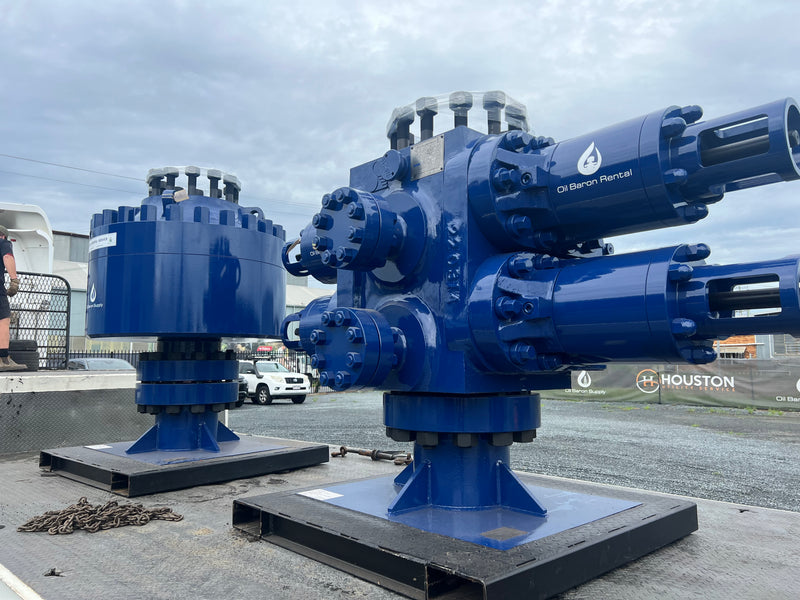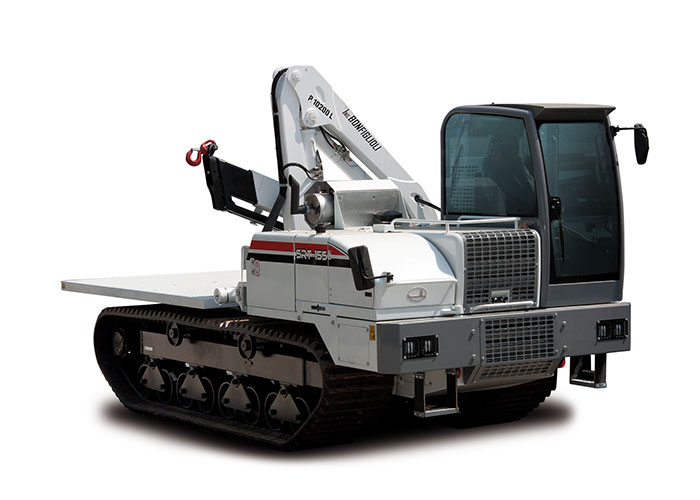A comprehensive overview to Superior Oilfield Rentals Texas and its key benefits
Wiki Article
A Comprehensive Guide to the Various Types of Oil Field Equipment and Pipeline Equipment Available
The oil and gas market depends heavily on specific devices for efficient extraction and transportation. Different kinds of machinery, from drilling rigs to tank, play vital roles in this complex procedure. Each item of tools offers distinctive features that contribute to overall operational success. Understanding these components is important for anybody associated with the industry. As the industry evolves, so too do the technologies that support it. What innovations are on the perspective?
Drilling Rigs: The Foundation of Oil Exploration
Drilling rigs serve as the crucial machinery in the domain name of oil exploration, allowing companies to gain access to hydrocarbon gets buried deep below the Planet's surface area. These rigs come in different kinds, including land rigs, offshore rigs, and mobile systems, each made to operate in particular settings. Equipped with sophisticated modern technology, piercing rigs can penetrate geological formations with accuracy, ensuring efficient resource extraction. The architectural honesty and functional capabilities of these rigs are crucial, as they need to stand up to extreme conditions and considerable stress. The choice of a boring gear influences the general job cost and timeline, making it an essential factor to consider for oil firms looking for to maximize their expedition initiatives and make best use of performance in their procedures.Pumps: Important for Fluid Movement
In the oil extraction procedure, the duty of pumps is considerable, assisting in the motion of fluids throughout various phases of manufacturing. Pumps are necessary for delivering unrefined oil, water, and other liquids from below ground tanks to the surface and afterwards via pipelines to refineries. They are available in various kinds, consisting of centrifugal, positive variation, and completely submersible pumps, each serving specific objectives based upon the fluid features and functional demands. Centrifugal pumps are frequently used for their performance in high-flow applications, while positive variation pumps master dealing with thick fluids. The selection of pump effects overall performance, operational safety and security, and maintenance prices. Appropriate selection and upkeep of pumps are essential for enhancing manufacturing and lessening downtime in oil field procedures.Shutoffs: Managing Flow and Pressure

Valves play an important duty in managing the flow and stress of liquids within oil areas and pipes. Various kinds of valves serve unique applications, each made to fulfill particular functions essential for effective procedure - Superior Oilfield Rentals. Understanding the attributes and uses these shutoffs is necessary for maximizing system efficiency and safety and security
Kinds of Valves
Crucial parts in oil area procedures, shutoffs play a critical duty in regulating the circulation and stress of fluids within pipelines and equipment. Various sorts of shutoffs are used to meet the diverse requirements of oil and gas production. Common kinds consist of entrance valves, which offer a straight-line flow and minimal stress decrease; globe shutoffs, recognized for their throttling abilities; and ball shutoffs, identified for their quick on/off control. Additionally, check shutoffs protect against heartburn, while butterfly valves offer a light-weight option for controling flow. Each shutoff type is designed with details products and setups to withstand the rough problems typically found in oil areas, making sure dependability and efficiency in procedures. Understanding these kinds is crucial for effective system monitoring.Valve Applications and Functions
While various sorts of valves serve unique purposes, their primary applications rotate around managing flow and pressure within oil and gas systems. Shutoffs such as gate, world, and ball valves manage liquid movement, guaranteeing peak performance and security. Gateway valves are typically made use of for on/off control, offering marginal flow resistance. Globe shutoffs, on the other hand, deal precise flow law, making them ideal for throttling applications. Sphere shutoffs are favored for their quick procedure and tight sealing abilities. Additionally, stress safety valve are essential for avoiding system overpressure, securing equipment stability. Generally, the appropriate choice and application of shutoffs boost functional efficiency, making sure the reliable transport of oil and gas with pipes and handling centers.Compressors: Enhancing Gas Transportation
Compressors play an important function in the reliable transport of natural gas, guaranteeing that you can look here it relocates efficiently via pipes over lengthy ranges. These devices increase the pressure of gas, enabling it to get rid of rubbing and altitude adjustments within the pipeline system. In addition, compressors facilitate the harmonizing of supply and need, accommodating fluctuations in consumption and production rates. Various sorts of compressors are employed in the industry, including centrifugal, reciprocating, and rotary screw compressors, each offering distinct benefits based upon the functional needs. Normal upkeep of these compressors is crucial to optimize effectiveness and decrease downtime, inevitably adding to a trusted gas transport network. Their important feature highlights the value of compressors in the general oil and gas infrastructure.Storage Tanks: Safe and Efficient Fluid Monitoring
Reliable transportation of all-natural gas depends on various sustaining systems, among which is the appropriate administration of storage containers. These storage tanks play a necessary function in safely having liquids, making certain that functional effectiveness is maintained while lessening environmental threats. Built go to this site from durable products, they are developed to endure high stress and destructive elements. Effectively sized and tactically situated, tank facilitate the smooth flow of all-natural gas and other liquids, avoiding traffic jams in supply chains. Regular upkeep and monitoring are essential to identify leaks or architectural issues, advertising safety and security and compliance with governing requirements. Ultimately, the efficient monitoring of tank is crucial for the total integrity and dependability of the oil and gas sector's fluid handling systems.
Pipeline Solutions: Framework for Transport
Pipeline systems work as the foundation of the oil and gas market, helping with the efficient transportation of hydrocarbons over substantial ranges. These systems include numerous components, including pipelines, shutoffs, pumps, and compressors, all carefully designed to guarantee seamless circulation. The products utilized in pipeline building, usually steel or high-density polyethylene, are picked for durability and resistance to rust. Pipeline networks can extend across land and water, attaching production sites to refineries and circulation facilities. In addition, progressed technology allows real-time tracking of circulation prices and stress levels, improving functional effectiveness. The calculated positioning of these pipes decreases ecological influence while optimizing source access, therefore playing an important role in meeting energy needs around the world.Security Equipment: Guaranteeing Worker and Environmental Management
The operation of pipeline systems, while necessary for energy transportation, also presents substantial safety and security obstacles for employees and the atmosphere. Security equipment plays a significant duty in minimizing these threats. Individual safety devices (PPE) such as safety helmets, gloves, and non-slip footwear safeguards workers from physical threats. In addition, gas detection systems keep track of for leaks, making certain that unsafe compounds do not pose a threat to employees or the bordering environment. Emergency situation shutdown systems are critical for swiftly halting operations throughout a dilemma, avoiding possible catastrophes. Spill containment products, including absorbents and obstacles, are right here essential for minimizing ecological impact. On the whole, buying all-encompassing security equipment is important for preserving functional honesty and protecting both workers and the atmosphere in the oil and gas sector.
Often Asked Concerns
Exactly how Do I Select the Right Oil Field Equipment for My Project?
Picking the appropriate oil area devices entails reviewing task specifications, spending plan restrictions, and functional requirements. Take into consideration aspects such as devices dependability, compatibility with existing systems, and the vendor's track record to guarantee peak performance and safety and security.What Are the Upkeep Demands for Oil Field Equipment?
Maintenance requirements for oil area tools consist of regular evaluations, lubrication, and timely fixings. Operators needs to likewise comply with manufacturer standards, display performance metrics, and guarantee conformity with security policies to boost long life and effectiveness.
Exactly How Can I Make Certain Compliance With Environmental Laws?
To assure conformity with environmental policies, firms must conduct routine audits, carry out best methods, purchase training, maintain proper paperwork, and stay upgraded on regulation (Superior rentals squeeze tools). Collaboration with environmental agencies can also enhance adherence to policiesWhat Is the Typical Life Expectancy of Pipeline Equipment?
The typical life expectancy of pipeline devices normally varies from 20 to half a century, depending upon aspects such as worldly high quality, environmental conditions, and maintenance practices. Regular evaluations can significantly affect long life and functional effectiveness.Exactly how Do I Safely Transfer Oil Field Equipment to Remote Locations?
Transferring oil field equipment to remote areas calls for mindful planning, including route analysis, safeguarding licenses, utilizing appropriate vehicles, and making certain safety and security procedures are complied with. Proper training and interaction amongst teams are vital for successful transport.Report this wiki page